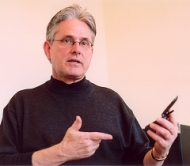




Scotts Valley Firm: FedEx for the Internet
|
| Benthall would receive little argument from most
computer users, which is probably why the executive is feeling
so confident these days. Synchron Networks claims it has solved what has been an expensive problem for many high-tech firms. Everserve, its first product, to be released next month, can deliver, update and patch software to network devices. The product could make expensive recalls a thing of the past. "We have software that delivers software," said Benthall. "We're kind of the FedEx for the Internet." |
 |
Benthall said Everserve also may bring the end of the practice
known as sneakernet. That is, the slow process of user manpower
to upgrade systems one by one. Instead, with just a few clicks,
Everserve is simple to use and can send out thousands of messages
at once and report back on whether the upgrades were successful.
As an example, Benthall said some large firms, such as banks, may
have 10 or 20 desktops in each branch and thousands of branches.
There may be one person in charge of 50 desktops who spends 75 percent
of the time conducting software upgrades.
"When you have massive amounts of devices employed remotely our
product makes a lot of sense," he said.
The executive should know. He recalls the days when he was Internet
technology structure manager for Exodus and 85,000 servers had to
be upgraded one at a time. That process would take just 10 minutes
with Everserve, he said.
Synchron Networks claims it is the first company out with such a
cross platform delivery mechanism. While other companies, such as
Microsoft, have built similar delivery mechanisms they have been
limited to the developer's particular brands. Synchron designed
Everserve for volume and without prejudice to a particular manufacturer.
Benthall said there is no limit to the size of the package it can
deliver. The firm already has tested the product with packages as
large as 500 megs.
The first version of Everserve will work for servers and desktops,
specifically Windows 2000, NT and Solaris. However, Synchron will
expand Everserve soon to use with the coming third generation (3G)
of mobile phone technology, which offers high-speed Web access,
streaming video and teleconferencing.
The 3G phones, like DSL modems, always will be on, offering providers
the ability to send applications at any time. Benthall said using
Everserve will be as easy as the cable company turning on a Pay-Per-View
channel.
"The market is wide open for someone who can deliver a secure reliable
solution," said Benthall. "Our vision is our software will be on
every device on the planet."
It is no coincidence Synchron announced the addition of Kevin Kennedy,
chief operating officer of Openwave, to its board of directors last
fall. Openwave is the world's largest provider of mobile Internet
software.
Synchron also announced it received its second round of funding,
$10 million, earlier this month.
| Everserve is the brainstorm of Carl Fravel, who
founded Synchron Networks in 1999 and now serves as president.
Previously, Fravel was senior development manager at Borland,
which is located in the same complex as Synchron at Enterprise
Way. Many of the 30 Synchron employees also worked at Borland at one time. Synchron also announced it received its second round of funding, $10 million, in early January. Synchron believes its product could unleash a rise in venture capital for other firms as well. |
 |
"All software developers can now release their products without fear," said Benthall. "And the good news about our software is that it can improve bugs in our own software as well."
Santa Cruz Sentinel, January 27, 2002, by Michael Iacuessa, photos by Dan Coyro